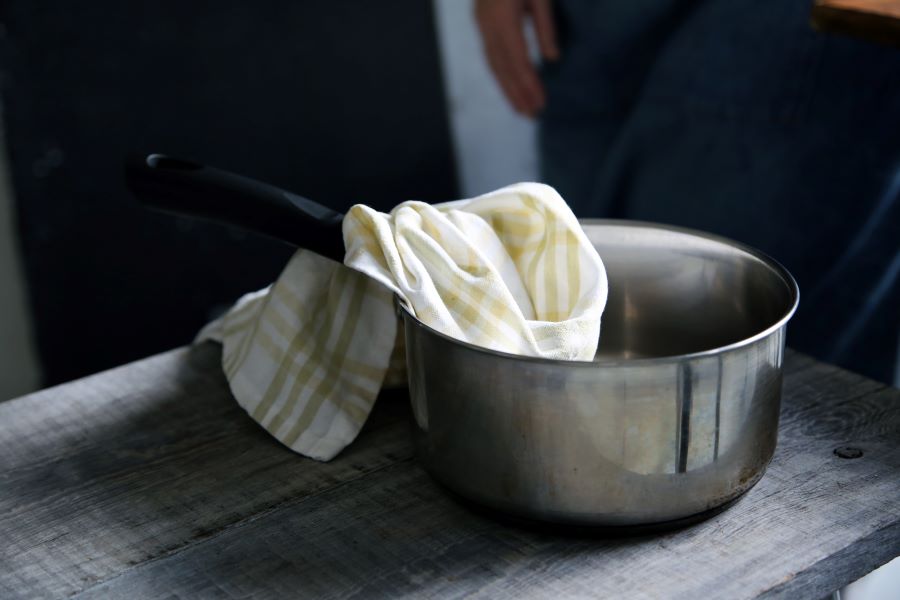We’ve all argued with our significant other or roommates about who took out the garbage last. But have you ever stopped to consider how fast that bag of trash accumulated? Or how much trash you’ve accumulated? In the United States, we throw nearly 40% of all the food that’s manufactured in the garbage. And food waste is just one piece of it. Did you know that 91% of plastics never get recycled?
If you find these statistics to be alarming, and want to make a change, there are plenty of ways to maintain a waste-free kitchen. Read on to learn more about some simple changes you can make at home that will have a big impact on your overall household waste.
1. Buy Vegetables and Fruits As You Need Them
Personally, I’ve always had the issue of buying too much produce and then it inevitably going bad when I can’t eat it all. So though buying a ton of produce in bulk is convenient, if you live alone or have a small family, you might want to consider buying produce as you need it. Whether that be for the entire week or just one day at a time, you’ll throw far less food in the garbage when you’re buying a realistic amount of vegetables for you and your family.
2. Skip The Plastic Produce Bags At The Store
The next time you’re at the store, skip the plastic produce bags. Though they can be convenient, they’re ultimately unnecessary if you’re just going to be washing your produce when it gets home anyways.

If you really want a separate bag, though, there are plenty of reusable produce bags available online that are far less wasteful than the single-use options available in the produce aisle.
3. Add A Kitchen Compost Bin
Along with trying to reduce your food waste in the first place, another way to cut back on the amount of food you’re sending to the landfill is by throwing your scraps into a kitchen compost bin. You don’t have to invest in a huge compost bin to make a difference, just a simple small kitchen compost bin will do the job. Of course, adding a compost bin inside of your home may attract pests, so it’s a good idea to get some help from pest control or a home inspector to see if there’s any signs of pests nearby.
4. Can, Dehydrate, or Ferment Extra Produce
Whether you’re a gardener or just happen to get a really good deal on a large amount of produce, preserving your extra fruits and vegetables for the winter is a great way to reduce food waste.

Canning allows you to store your otherwise perishable food pretty much anywhere while dehydrating your produce makes for excellent dried snacks for camping and hiking. Reduce your food waste and have some yummy snacks– win-win!
5. Try Going Totally Plastic-Free For a Month
Maybe you want to get a feel for how much plastic you waste before you jump into the zero-waste life? One way to know how much you rely on plastic is by vowing to go plastic-free for a month.
That means no single-use coffee cups, no take out boxes, and no plastic food containers. Though that might sound easy enough, you’ll start to realize very quickly just how much plastic is used in everything. To get a little inspiration and advice, check out this hashtag on Instagram: https://www.instagram.com/explore/tags/plasticfreejuly/
6. Ditch Paper Towels For Reusable Cloth Towels
Again, sometimes convenient doesn’t always mean best. Though paper towels are convenient and get the job done, they’re not especially environmentally friendly and in most households, they get tossed along with all the other household waste. So instead of reaching for that pack of paper towels, consider instead switching to a reusable cloth alternative.
There are cloth paper towels that have a similar function as paper towels and can be wrapped around a paper towel holder and used in pieces. The cloth paper towels are connected with snaps and can be thrown in the washer when they’re spent! Not only will you save yourself money by not having to buy paper towels, but you’ll save a ton of water and trees that would otherwise be used to make paper towels.
7. Buy In Bulk & Bring Your Own Jars To The Store
Rather than buying you rice, quinoa, granola, and other grains and seeds in a new bag every time, consider shopping in the bulk section at your local grocery store or food co-op. Invest in some quality sealed jars, and fill up your necessities in there rather than buying a whole new package.
Generally, bulk foods are cheaper, and you’ll be reducing the amount of packaging waste that’s created. Not to mention, your kitchen will look especially organized and pretty with matching jars lining the pantry.
8. Make Your Own Cleaning Products
You’d be surprised what simple ingredients like a bottle of castile soap, borax, baking soda, and essential oils can do. Many common household cleaning ingredients can be made with just a few common ingredients that you probably have at home already.
Take these recipes, for instance. Many of these recipes require only 4-5 ingredients and can clean just about any part of your home. Choosing to make your cleaning supplies rather than buying a new bottle at the store every time you run out will save lots of plastic from entering the waste stream, as you can reuse the same spray bottles over and over again.

And as an added bonus, many traditional cleaners are also packed full of all sorts of chemicals, and by making the cleaning supplies yourself, you know exactly what your spraying into the air.
If you really like the idea of making your own household products and want to expand it to the bathroom and laundry room, check out these recipes for DIY soap and homemade laundry detergent.
9. Just Say No To Single Use Coffee Cups
You know what they say, old habits die hard. And that statement is especially true for single-use coffee cups. Between drive-thrus and online ordering, resisting the urge to drink out of a single-use coffee cup just gets more and more difficult to resist. But take the extra steps and time to utilize a reusable travel mug and you can make a big difference in terms of your waste.
Think about it this way, if you get a coffee every morning from your local coffee shop, that’s 365 cups a year. If you keep this habit up for only 5 years, that’s 1,825 cups. Imagine if we all skipped the single-use cups, what a difference that could make!

Going zero-waste is a life long endeavor that isn’t going to happen overnight. Take small steps and adjustments in your life, and sooner or later you’ll be making a big impact. How do you maintain a waste-free kitchen? Let us know in the comments below!
Bio: Leigha is the managing editor of Insteading.com, a homesteading and sustainability site focused on everything from gardening and raising chickens to off-grid living and tiny homes.


